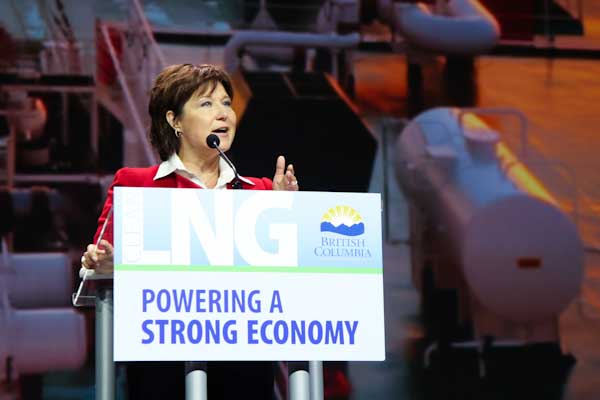Since her 2013 re-election, Premier Christy Clark has positioned liquefied natural gas as the solution to B.C.'s financial woes. She even found a way to link the province's nascent LNG industry to income support for the disabled, claiming at a recent press conference that B.C. will "be able to afford to improve and invest in social programs" only by exporting gas to Asia. This spring she argued LNG will "transform our economy, pay off debt and create a better future for our children."
Those are bold claims, resting on equally bold assumptions. Crucial among them is that economies like Japan's will pay an Asian premium for B.C. LNG much higher than what it costs here to produce. To test the assumption, I sat down with Dr. Ken Koyama at the Asia Pacific Foundation of Canada's Vancouver office. Koyama was visiting from Tokyo, where he's chief economist at the Institute of Energy Economics Japan, and an advisor to the country's Ministry of Economy, Trade and Industry.
He's also a globally recognized expert on natural gas markets. These days there's a lot to keep track of. So many countries are now scurrying to supply Asia with LNG that Koyama describes the competition as "very severe." As a result, he says it's "quite difficult to expect a big profit margin for any LNG supplier," especially for the costly projects being developed in B.C. Read on to learn why else he thinks the high Asian prices needed to achieve Clark's LNG dreams are unlikely to be realized.
On why Japan is now the world's largest importer of LNG:
"Japan is totally dependant on energy imports, including natural gas in the form of LNG, particularly after the nuclear crisis in Fukushima three years ago.... Currently we have 50 commercial nuclear power plants in Japan, but all are offline because of safety concerns for locals.... So for this year LNG demand for Japan will be as high as the last year, which is a record year, almost 88 million metric tons."
On why Japan pays such high prices for natural gas:
"In Japan, LNG prices are based on the price of imported crude oil. We call it the JCC, the Japan Crude Cocktail. It's the average of Japan's crude oil import prices. After 2011, international crude oil prices stayed above $100 per barrel due to many factors, including geopolitical factors in the Middle East. Because of this, Japan's LNG price... became very, very high, sometimes up to $16 or $17 per million BTU [or British thermal units, a standard industry measure of gas volumes]."
On all the countries rushing to cash in on these prices:
"In North America, there are a number of planned or undergoing LNG projects that are expected to start supplying Asian markets in 2016 or 2017... Canadian LNG projects are expected to become available for the market sometime around 2020.... [Other growing supply sources are] Russia or Australia or East Africa, including Mozambique. There's a very severe competition in the Asian market right now."
On how LNG from the United States may drive prices down:
"LNG prices in the United States are based on Henry Hub.... It's a benchmark price determined purely by supply and demand of natural gas.... When Henry Hub is $5, and liquefaction and transportation is, say, something like $6 to $7, then the overall cost is around $12, which is much lower than [what Japan pays]. So there is a big expectation we may be able to import much cheaper LNG from the United States."
On why Asia is especially challenging for B.C. gas suppliers:
"If the Asian LNG price is very low, it's quite difficult to expect a big profit margin for any supplier.... But one characteristic of Canadian LNG projects, including B.C., is that all are greenfield projects [essentially, all the infrastructure needs to be built from scratch], which need a very big initial investment.... To secure this large-scale investment and to secure market outlets may be a very big challenge."
On how Russia may be edging out competitors in Asia:
"We need to pay attention to what's going to happen in China in particular, where we expect that LNG demand will increase very substantially. But last month China agreed with Russia to a big pipeline gas supply deal, which also affects the appetite of China to import LNG. So the market dynamics are changing very, very rapidly."
On the implications of Japan restarting its nuclear plants:
"The future of nuclear in Japan has great implications for its LNG appetite.... A nuclear regulatory authority created two years ago is [looking at] whether or not some nuclear power
plants can be restarted.... Depending on the degree and the pace of the nuclear restart, I think LNG import requirements in Japan can be lowered." ![]()
Read more: Energy, Environment
















Tyee Commenting Guidelines
Comments that violate guidelines risk being deleted, and violations may result in a temporary or permanent user ban. Maintain the spirit of good conversation to stay in the discussion.
*Please note The Tyee is not a forum for spreading misinformation about COVID-19, denying its existence or minimizing its risk to public health.
Do:
Do not: